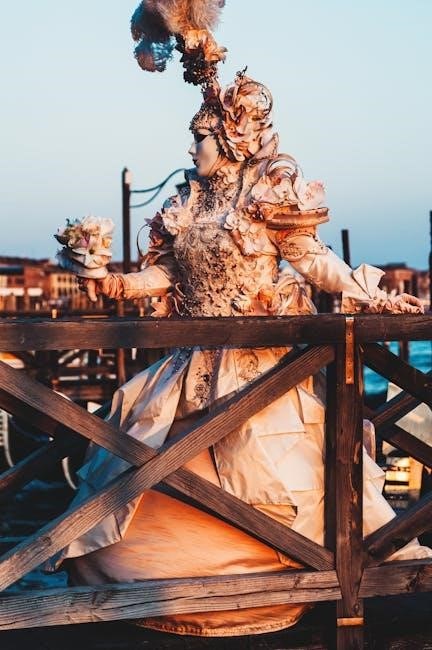act iii romeo and juliet study guide

Act III unfolds with the fatal fight between Mercutio and Tybalt, leading to Mercutio’s death and Romeo’s vengeful killing of Tybalt․ Romeo is banished, while Juliet’s parents arrange her marriage to Paris, escalating the tragic conflict and setting the stage for the lovers’ doomed fate․
1․1․ Overview of Key Events
Act III of Romeo and Juliet is marked by escalating tensions and tragic consequences․ The act begins with Benvolio and Mercutio discussing the hot weather, which Benvolio believes could lead to a fight․ Tybalt arrives, seeking Romeo, and insults him, but Romeo refuses to fight due to his secret marriage to Juliet․ Mercutio steps in, leading to a duel where Mercutio is fatally wounded by Tybalt․ In a rage, Romeo kills Tybalt and is banished from Verona․ Meanwhile, Juliet’s parents arrange her marriage to Paris, unaware of her marriage to Romeo․ Juliet seeks help from Friar Laurence, who devises a plan to fake her death to avoid the marriage․ These events intensify the tragic conflict, setting the stage for the play’s heartbreaking conclusion․
1․2․ Impact of Act III on the Play’s Tragedy
Act III significantly accelerates the tragic momentum of Romeo and Juliet․ The deaths of Mercutio and Tybalt eliminate the last remnants of humor and camaraderie, plunging the story into darkness․ Romeo’s banishment isolates him from Juliet, heightening their emotional desperation․ Juliet’s arranged marriage to Paris intensifies her internal conflict, forcing her to seek drastic solutions․ Friar Laurence’s risky plan to fake her death introduces a precarious hope, setting the stage for inevitable miscommunication․ These events collectively deepen the sense of inevitability and doom, fulfilling the prophecy of the star-crossed lovers․ Act III transforms the narrative from a tale of love and hope to one of irreversible tragedy, cementing its place as a pivotal turning point in the play․

Key Scenes in Act III
The fatal duel between Mercutio and Tybalt, Romeo’s impulsive revenge, and his subsequent banishment are pivotal․ Juliet’s emotional turmoil and the symbolic balcony scene intensify the tragic tension․
2․1․ The Fight Between Mercutio and Tybalt
The fight between Mercutio and Tybalt in Act III is a pivotal and tragic moment․ It begins when Tybalt, seeking revenge for Romeo’s presence at the Capulets’ ball, confronts Mercutio․ Despite Benvolio’s attempts to calm the situation, Mercutio provocatively engages Tybalt, leading to a duel․ Romeo, bound by his secret marriage to Juliet and his vow of peace, refuses to fight Tybalt․ This enrages Mercutio, who takes up the challenge․ The duel ends fatally when Tybalt stabs Mercutio, who dies shortly after, cursing both families․ Romeo, overcome with grief and anger, kills Tybalt in revenge, leading to his banishment from Verona․ This scene highlights the destructive nature of the feud and the impulsive decisions of the characters, escalating the play’s tragic momentum․
2․2․ Romeo’s Banishment and Its Consequences
Romeo’s banishment from Verona is a direct consequence of his impulsive actions in avenging Mercutio’s death by killing Tybalt․ The Prince, aiming to maintain order, exiles Romeo to Mantua․ This separation from Verona isolates Romeo from his family, friends, and most tragically, his newlywed wife Juliet․ The banishment disrupts the secret marriage and creates a sense of hopelessness for the young lovers․ Without Romeo’s presence, Juliet is left to face her arranged marriage to Paris alone, intensifying her desperation․ The distance also hampers communication, leading to misunderstandings that ultimately contribute to the tragic conclusion of the play․ Romeo’s exile symbolizes the harsh penalties of impulsive behavior and the enduring conflict between the Montagues and Capulets, further entrenching the cycle of revenge and sorrow․

Character Analysis in Act III
Act III reveals Romeo’s impulsive nature and deep emotional turmoil, while Juliet’s defiance of her parents showcases her growing independence and loyalty to Romeo․ Tybalt’s aggression intensifies the conflict, highlighting his vengeful character․
3․1․ Romeo’s Emotional Struggle and Decisions
Romeo’s emotional journey in Act III is marked by intense inner conflict and impulsive decisions․ His refusal to fight Tybalt initially reflects his peaceful nature and loyalty to Juliet, yet after Mercutio’s death, he succumbs to rage․ Killing Tybalt leads to his banishment, a consequence that devastates him․ Romeo’s emotional turmoil escalates as he grapples with guilt and loss, ultimately seeking solace in Friar Laurence․ His decisions, driven by love and vengeance, highlight his tragic vulnerability and the destructive power of unchecked emotions, setting the stage for the play’s tragic conclusion․
3․2․ Tybalt’s Role and Motivations

Tybalt, as Juliet’s cousin, embodies the fierce rivalry between the Capulets and Montagues․ His hatred for Romeo stems from a deep sense of loyalty to his family and a desire to defend their honor․ In Act III, Tybalt’s impulsive and aggressive nature drives the tragic events, as he provokes Mercutio into a duel․ His refusal to back down reflects his pride and adherence to a code of honor․ Tybalt’s actions lead to Mercutio’s death, which in turn prompts Romeo to kill him, resulting in Romeo’s banishment․ Tybalt’s motivations are rooted in vengeance and family pride, making him a catalyst for the play’s tragic outcomes․ His death intensifies the cycle of revenge and deepens the conflict between the two families, highlighting the destructive nature of their feud․

Themes Explored in Act III
Act III explores fate vs․ free will, the destructive power of hate and revenge, and the enduring strength of love amid tragic conflict․
4․1․ Fate vs․ Free Will
The interplay between fate and free will in Act III is central to the tragedy․ Romeo and Juliet’s choices, driven by love and loyalty, seem to defy fate, yet events unfold as if predetermined․ Their decisions, like Romeo’s refusal to fight Tybalt and his subsequentbanishment, accelerate the tragic outcome․ Fate appears inescapable, as their actions align with the prophecy of their doomed love․ However, their free will in pursuing each other despite obstacles highlights the tension between personal agency and destiny․ This theme underscores the inevitability of their fate, leaving the audience questioning whether their choices were truly free or part of a larger, unalterable plan․
4․2․ Love, Loyalty, and Revenge
Act III delves deeply into the themes of love, loyalty, and revenge, driving the tragic progression of the play․ Romeo’s love for Juliet initially prevails, but the death of Mercutio at Tybalt’s hand ignites a cycle of revenge․ Romeo, once a symbol of love, succumbs to hatred, killing Tybalt and abandoning his peaceful nature․ This act of revenge highlights the destructive power of hatred and loyalty to friends․ Meanwhile, Juliet’s loyalty to Romeo remains unwavering, even as her family pressures her to marry Paris․ The interplay of these themes underscores the devastating consequences of prioritizing revenge over love and loyalty, ultimately accelerating the tragic fate of the lovers․

Literary Devices in Act III
Foreshadowing and dramatic irony intensify the tragic tension in Act III, while vivid imagery and metaphors enrich the emotional depth of key scenes․
5․1․ Use of Foreshadowing
In Act III of Romeo and Juliet, Shakespeare employs foreshadowing to hint at the tragic events that will unfold․ Benvolio’s warning about the hot weather and potential brawls sets the stage for the fatal confrontation between Mercutio and Tybalt․ Romeo’s refusal to fight Tybalt, citing the fear of consequences, subtly foreshadows Mercutio’s death․ Additionally, Romeo’s ominous remarks after killing Tybalt, such as “I am fortune’s fool,” suggest his impending doom․ Juliet’s premonitions of death in her balcony speech further reinforce the sense of unavoidable tragedy․ These instances of foreshadowing create a tense atmosphere, preparing the audience for the devastating conclusion of the act and the eventual downfall of the star-crossed lovers․
5․2․ Imagery and Symbolism
In Act III of Romeo and Juliet, Shakespeare uses vivid imagery and symbolism to deepen the emotional and thematic resonance․ The fight scene between Mercutio and Tybalt is fraught with violent imagery, emphasizing the bloodshed and chaos that disrupt Verona’s peace․ Juliet’s balcony, a symbol of love and isolation, contrasts with the dark, public streets where violence erupts․ Light and darkness are recurring symbols, with light representing love and darkness foreshadowing death․ Romeo’s dagger, a symbol of fate and destruction, appears in his imagination, hinting at his tragic demise․ These elements create a rich tapestry of meaning, underscoring the play’s exploration of love, conflict, and inevitability․ The imagery and symbolism in Act III amplify the tension, preparing the audience for the devastating events that follow․

The Balcony Scene in Act III
The balcony scene in Act III showcases Juliet’s emotional turmoil as she confesses her love for Romeo, while he secretly listens, intensifying their romantic tension․
6․1․ Juliet’s Emotional Conflict
Juliet’s emotional conflict in Act III reaches its peak as she grapples with her love for Romeo and her loyalty to her family․ Her famous balcony soliloquy reveals her deep longing for Romeo, yet she is torn by the societal expectations and familial obligations that threaten to tear them apart․ Juliet’s isolation is evident as she questions her identity and the fate that binds her to a rival family․ Her words, “O Romeo, Romeo! Wherefore art thou Romeo?” highlight her anguish and desire to transcend the hatred between their families․ This scene underscores Juliet’s internal struggle, showcasing her vulnerability and the immense pressure placed upon her by her love and circumstances․
6․2․ The Significance of the Balcony as a Symbol
The balcony in Act III symbolizes Juliet’s isolation and the divide between her private emotions and the public world․ It serves as a bridge between Juliet and Romeo, representing their love’s transcendence of societal barriers․ The balcony is also a space of hope and longing, where Juliet expresses her deepest desires․ Its physical elevation emphasizes her emotional height and vulnerability․ The imagery of the balcony contrasts the confinement of her family’s expectations with the freedom of her love for Romeo․ Additionally, it symbolizes the divide between the private and public spheres, highlighting the tension between personal feelings and societal obligations․ The balcony remains a powerful symbol of love’s enduring nature despite the obstacles surrounding it․

Study Questions for Act III
How does the fight between Mercutio and Tybalt escalate? Why does Romeo refuse to fight Tybalt? What motivates Tybalt’s hatred for Romeo? How does Juliet react to Romeo’s banishment? What role does fate play in the tragic events of Act III?
7․1․ Comprehension Questions
- Why does Benvolio believe a fight will occur at the beginning of Act III?
- What does Tybalt call Romeo, and how does Romeo respond?
- Why is Romeo reluctant to fight Tybalt, and what changes his mind?
- How does Mercutio’s death affect Romeo, and what action does it provoke?
- What punishment does the Prince give Romeo after Tybalt’s death?
- How does Juliet react when she learns of Romeo’s banishment?
- What plan does Friar Laurence propose to help Juliet avoid marrying Paris?
- What role does fate play in the tragic events of Act III?
These questions ensure a thorough understanding of the plot, character motivations, and key events in Act III․
7․2․ Analysis and Interpretation Questions
- How does the fight between Mercutio and Tybalt reveal the characters’ personalities and motivations?
- What does Romeo’s decision to kill Tybalt suggest about his emotional state and sense of responsibility?
- Analyze Juliet’s soliloquy in the balcony scene: what does it reveal about her inner conflict?
- How does Friar Laurence’s plan to help Juliet reflect his understanding of fate and human agency?
- What role does fate play in the tragic events of Act III, and how does it shape the characters’ choices?
- Discuss the symbolism of the balcony as a setting for Juliet’s emotional struggle․
- How does Shakespeare use dramatic irony in Act III to heighten tension?
These questions encourage a deeper exploration of character development, themes, and literary techniques in Act III․

Vocabulary and Key Terms
Key terms in Act III include villain (Tybalt’s insult to Romeo), banished (Romeo’s punishment), and foreshadowing (hints of tragic outcomes)․ Understanding these enhances comprehension of the play’s themes․

8․1․ Definitions of Important Words
In Act III, key terms like villain (Tybalt’s insult to Romeo) and banished (Romeo’s punishment) are crucial․ Foreshadowing hints at tragic outcomes, while fate highlights the characters’ lack of control․ These words deepen the play’s emotional and thematic impact, essential for understanding the escalating conflict and doomed love story․
8․2․ Contextual Understanding of Vocabulary
In Act III, vocabulary like villain and banished carry significant weight․ Villain reflects Tybalt’s contempt for Romeo, while banished highlights Romeo’s exile, a pivotal plot point․ Terms like foreshadowing and fate emphasize the inevitable tragic outcome․ Understanding these words in context helps grasp the emotional depth and thematic complexity, such as the conflict between personal choice and destiny․ The language underscores the escalating tensions and the characters’ emotional struggles, making it essential for analyzing the play’s dramatic progression and character motivations․